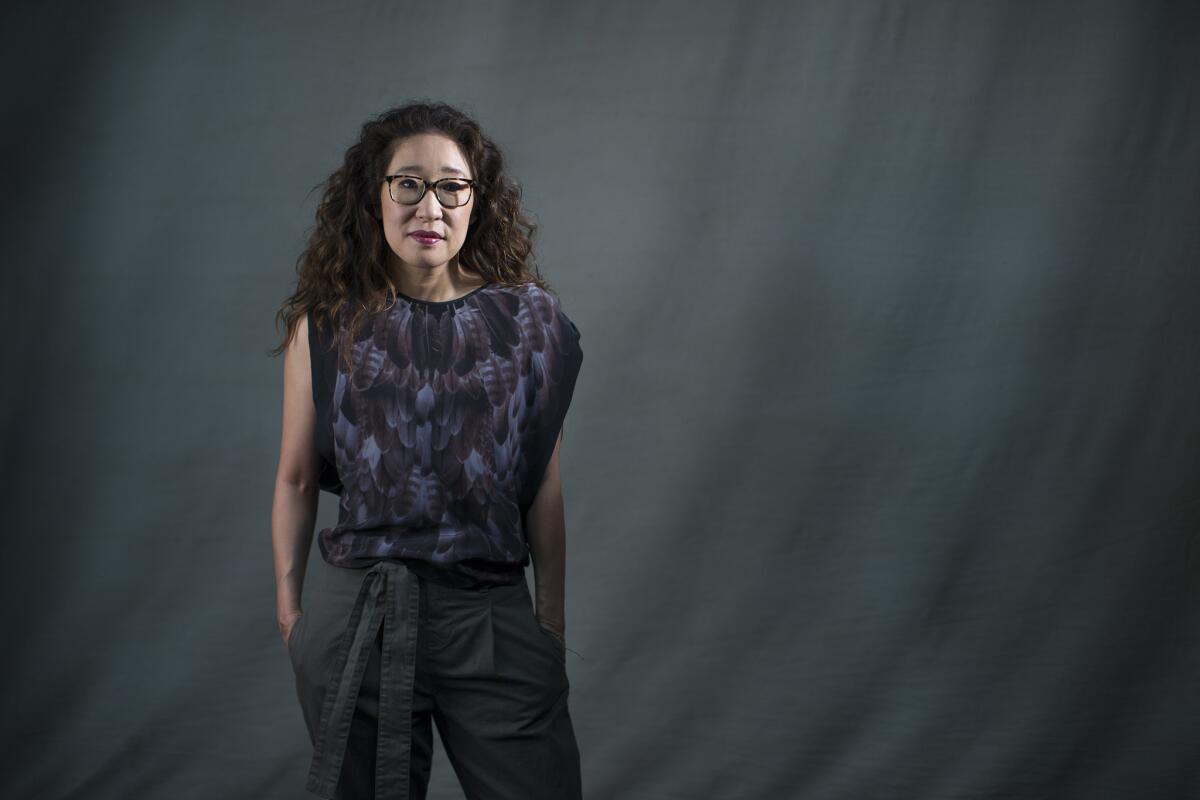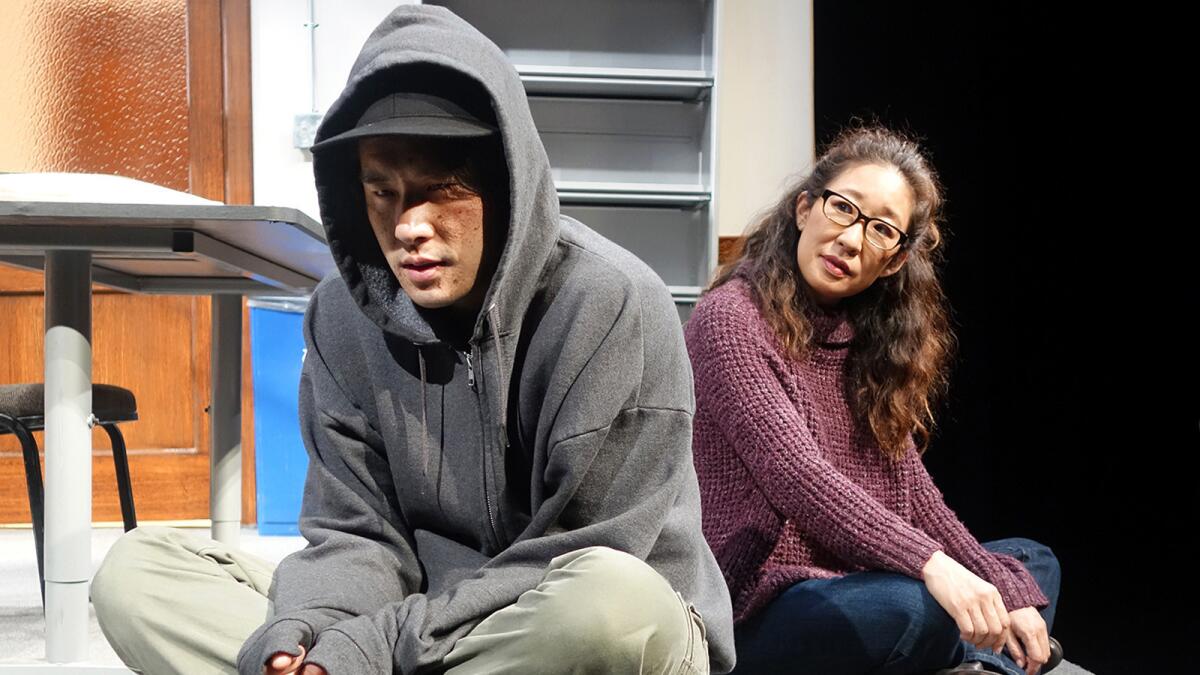Sandra Oh trades ‘Grey’s Anatomy’ for a new play inspired by 2007 Virginia Tech shooting

Actress Sandra Oh is starring in the play “Office Hour” at the South Coast Repertory.
Sandra Oh left “Grey’s Anatomy” two years ago to pursue new adventures and an old love — theater. The actress, 44, had spent 10 seasons on the ABC drama, winning Golden Globe and Screen Actors Guild awards and earning five Emmy nominations for her portrayal of hard-driving heart surgeon Cristina Yang.
Since hanging up her scrubs, the self-described Korean Canadian Los Angeleno has focused on stage and screen projects that, she says, reflect her “super-indie roots” and desire to help “voices that haven’t been heard get heard.”
This weekend, Oh begins a two-week run in the world premiere of Julia Cho’s “Office Hour” at South Coast Repertory in Costa Mesa. She plays a writing professor who reaches out to a student others see as strange and scary — with unexpected results.
Tell us about “Office Hour.”
It’s hard to talk about without giving away all the reveals. There are so many layers. At the outset, it’s about a conversation between a professor named Gina and a student named Dennis. Inside that conversation, so much more is going on.
One interesting thing is the suggestion that there are multiple realities. It will jar you out of your own point of view or make you realize you came in with a very specific point of view. It also opens up something great — the idea of uncertainty.

Raymond Lee and Sandra Oh in South Coast Repertory’s 2016 world premiere of “Office Hour” by Julia Cho.
Cho has said she was inspired to write “Office Hour” by the 2007 Virginia Tech shooting in part because the gunman also was of Korean ancestry. Although the play explores campus violence, it sounds like the core issues are race, culture and alienation.
Dennis represents so much of the shadow side of all of us. The parts that are ignored, wounded, angry. Gina’s task is to make contact with him, to make a connection with that part of Dennis. Hopefully, it’s also a chance for all of us to make a connection with that part of ourselves.
What does this play mean to you?
I find that this is a deeply Asian American play. I feel extremely connected to it through my own cultural experience. By that I mean there are subjects that we don’t talk about in our community and that I don’t think the community at large is aware of. Dennis feels unseen, ignored, misunderstood. Somehow, that leads into an experience I think a lot of young people have and an experience a lot of people who feel that way in terms of the larger society have. Of course, Dennis is also a very troubled character.
As an actor, it is rare to have this kind of rich material to draw upon. Julia’s writing has such a beautiful, lyrical quality. The emotional lives of her characters have a real poignancy. I hope this play will resonate with everyone.
You are best known for roles on television (“Grey’s Anatomy,” “Arliss”) and in movies (“Sideways,” “Under the Tuscan Sun”). People may not realize that you’ve been performing onstage since you were a kid.
I was born in a suburb of Ottawa and started acting in plays when I was 10. I attended the National Theatre School of Canada and started working in TV and film. Until “Grey’s Anatomy,” I was able to find time to keep doing plays such as Diana Son’s “Stop Kiss” in New York and [Federico García] Lorca’s “The House of Bernarda Alba” at the Taper.
You seem to be drawn to material with social and political themes.
It’s not that I do a play specifically because of its social aspect, but there must be an element of that because those are the choices I make. I’ve picked roles mostly because they are great parts in beautiful plays that hope to both entertain and tell stories that are not usually told.
The chance to tell such stories was one reason you left “Grey’s Anatomy.”
I felt I had done my job. I had explored everything that I could with my character. I loved the camaraderie of that show. So the motivation to go was creative. I am so grateful that [series creator] Shonda Rhimes understood that I needed to make that choice. After I left, I did Ariel Dorfman’s play “Death and the Maiden” in Chicago, and it felt great to be thrown into the deep end and remember that I could swim. I also helped a wonderful animator produce her film “Window Horses” [with a voice cast that includes Oh, Ellen Page and Shohreh Aghdashloo] about a young Chinese-Iranian-Canadian woman who is a poet. And I shot a micro-indie called “Catfight.” In my work choices lately, I want to be moved, to feel I really have to do this.
What moves you?
A lot of people’s focus is on the struggle to not be seen as “other.” But I am at the stage in my life where I want to tell stories from an Asian American perspective. The reason why is that it’s not generic. For example, anyone can do “Office Hour.” The only thing that is fairly specific is that the professor and student be of the same race or culture. There is a level of specificity I can bring to this play from my own cultural experience. I want to explain my culture’s experience.
I didn’t think this way 15 years ago. Back then, I just had to be accepted as the same. I don’t want to be that anymore. It’s not like I want to play the other. I want to play us.
You’ve expressed interest in returning to “Grey’s Anatomy” for its eventual series finale. Rumor has it you may appear on the show even sooner.
I love that there are rumors.
What’s next for you?
I’m going to do the Sundance playwrights’ lab to workshop Hansol Jung’s “Wild Goose Dreams,” where I play a North Korean defector. I want to do more theater, including more theater in L.A.
More to Read
The biggest entertainment stories
Get our big stories about Hollywood, film, television, music, arts, culture and more right in your inbox as soon as they publish.
You may occasionally receive promotional content from the Los Angeles Times.










